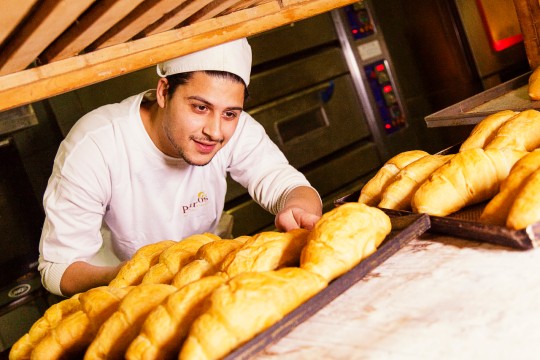From UNDP
An irresistible aroma of freshly baked bread spreads through Elida Markets in Kumanovo. It is early in the morning but already a long line of customers has formed at the bakery’s mouth-watering display of bread and bureks, small leek and spinach banitsas, pretzels and flaky buns.
The tireless bakers at the Elida Markets Bakery have been working hard since dawn. Amongst them is 28-year-old Rufat Demirovski, a relative newcomer to baking who has already earned himself a place as an indispensable part of the team.
Rufat’s success story highlights the important role played by mentors, coaches, and the Roma Information Centres.
“I trained to be a mechanic and now I’m a baker,” he says. “People find that quite strange, but actually there are more connections between the two professions than you might think at first glance. For example, in both trades it’s your hands that are the main tools.”
Rufat was disheartened by the difficulty of finding a job as a mechanic, but the challenge also made him rethink his career options and ultimately persuaded him to gain more qualifications.
“I decided I needed to retrain,” he says, “and eventually I applied for a training course in Baking at the Workers’ University in Skopje.”
After gaining a professional certificate as a baker in 2008, Rufat approached his local Roma Information Centre in Kumanovo and was assigned a coach, Ahmed, who helped him make a job-seeking plan, advising Rufat on how to focus his applications and how best to present his skills.
Rufat’s success story highlights the important role played by mentors, coaches, and the Roma Information Centres. These have proved invaluable in informing and motivating members of the Roma population who face many more obstacles than most in entering the labour market. Whereas the jobless rate for the general population is now 25.5%, for Roma it is estimated as high as 75%.
The Information Centres were initially developed and piloted with the aim of increasing the participation, success and retention rates of unemployed Roma in the numerous active labour market measures introduced in the country since 2007.
Roma participation in former Yugoslav Republic of Macedonia’s otherwise highly successful Self-Employment Programme has been disappointingly low. This low rate of participation has been attributed in part to high rates of illiteracy and education among that group.
The programme was designed to provide individual guidance so that candidates could enter the labour market.
The initial pilots carried out in four municipalities throughout the country showed dramatic results: more Roma candidates succeeded in 2014 than in the past seven years combined.
The success of the piloted services has led to their inclusion within the country’s annual Operational Programme for Employment, with a budget allocated for funding these services in the Programme for 2015.
As a result, over 1000 Roma people were introduced to the available employment opportunities, and after a few months of coaching, 176 found a job (42% youth and 41% women).
In 2016, the Government decided to extend the coaching and mentoring services to cover the needs of other vulnerable people at risk of socio-economic exclusion.
UNDP’s key partners in devising the new coaching and monitoring services include the Ministry of Labour and Social Policy (which also served as the national coordinator of efforts within the Decade of the Roma initiative), the Employment Service Agency, local municipalities and civil society organisations.
Source: http://goo.gl/eocFjh


